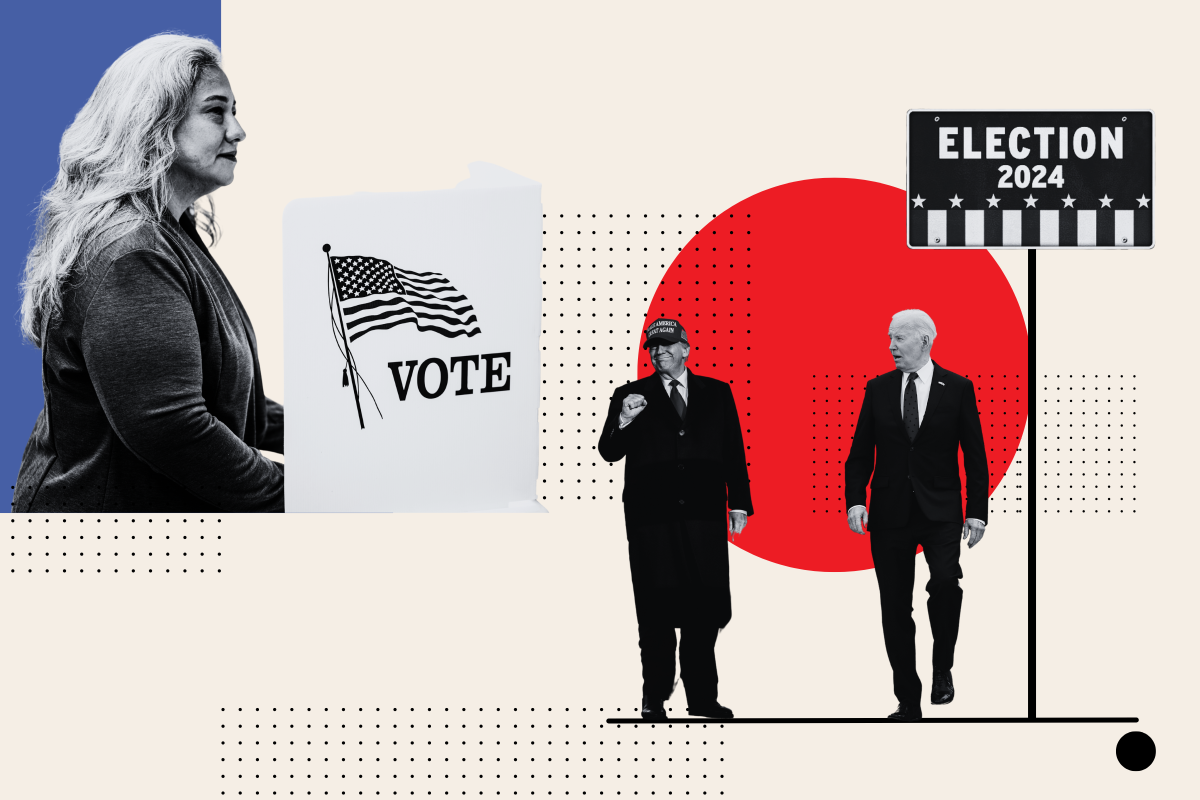Latino voters are likely to play a "decisive role" in the 2024 presidential election, according to Clarissa Martínez-de-Castro, vice president of the Latino Vote Initiative being run by UnidosUS, which claims to be America's "largest Latino civil rights organization."
Martínez-de-Castro argued their impact is likely to be amplified as they are "geographically concentrated" in both battleground states and states containing a lot of Electoral College votes, with around 25 percent taking part in their first ever presidential election.
Recent polling suggests the battle between Joe Biden and Donald Trump, the presumptive presidential nominees of the Democratic and Republican parties respectively, is currently close. A Marist National Poll of 1,192 registered voters conducted in mid-April gave Biden a three-point lead in a head-to-head contest, with 51 percent of the vote against 48 percent for Trump. However, a Public Opinion Strategies poll for NBC News conducted over the same period put Trump on 46 percent against 44 percent for Biden once other candidates were excluded.
Speaking to Newsweek, Martínez-de-Castro said: "Latinos will play a decisive role in the 2024 election. They are a critical factor in the winning equations for the White House, Congressional balance of power, and numerous state and local races.
"Latinos are geographically concentrated in states that are rich in primary delegates and Electoral College votes (California, Florida, New York, Texas), are electoral battlegrounds (Arizona, Nevada), or both. In addition, given razor-thin margins of victory, even in battleground states with smaller Latino populations—like Georgia, Pennsylvania, Wisconsin—these voters have the ability of tipping the outcome."
At the 2022 midterm elections, there were 31.2 million Hispanic citizens of voting age, of whom 18 million were registered to vote and 11.8 million actually cast a ballot, according to data compiled by UnidosUS.
Martínez-de-Castro argued increasing Latino voter registration could have a dramatic impact on the 2024 presidential election and claimed it is "not rare to hear from Latinos that no one had talked to them about voting or invited them to register."
She added: "Building on the fact that more than 80 percent of Latino registered voters vote in presidential elections (88 percent in 2020), a critical opportunity is tackling the registration gap: 13 million and growing.
"Yet, underinvestment in and ineffective outreach to these voters persist, compounded by mistaken assumptions about this electorate. Much of the work to close the registration gap has been left to nonpartisan, nonprofit organizations, with anemic funding to do so, particularly when compared to the expenditures seen every election cycle."
UnidosUS commissioned a poll of 3,037 eligible Latino voters across the United States between November 2-13, 2023, which was conducted by BSP Research.
The survey found 47 percent approved of the way Biden was performing as president, against 44 percent who disapproved and another nine percent who answered "don't know."

In total, 48 percent said they felt the Democrats "care a great deal" about the Latino community whilst 41 percent said they "don't care much" and 11 percent viewed them as "hostile."
By contrast, only 25 percent said Republicans "care a great deal" about Latinos, with 48 percent saying they "don't care much" and 26 percent viewing them as "hostile."
Some recent polling has suggested Hispanic voters, defined as those with ancestry in a Spanish-speaking country, most of whom are also Latino, are moving away from the Democratic Party. For example a recent American Principles Project/On Message survey of Hispanic voters in Arizona and Nevada found Trump and Biden in a statistic dead heat, with 43 percent of the vote versus 44 percent.
Martínez-de-Castro agreed there has been some "erosion" in Latino support for the Democrats, but argued it has been overstated by some media reports.
She commented: "Generally, at the presidential level, Latino voter support has averaged about two thirds supporting Democrats and one third Republicans. The overall combined average for all available election-eve and exit poll data for the period 1988-2020 is 29 percent support for Republicans, 67 percent support for Democrats.
"The high-water mark for Republicans was achieved by George W. Bush in 2000 (40 percent), and for Democrats, depending on the polling source, Bill Clinton, Barack Obama, or Hillary Clinton, who all garnered above 70 percent. In the past decade, when Republicans experienced erosion in Latino support, Democrats picked up much of it. But Democrats did not solidify that support to their column, so we are seeing Republicans recoup some of those voters."
When asked about migration, Martínez-de-Castro said the November 2023 UnidosUS poll found Latino voters "want to see a functional, well-managed immigration system" including "border security."
"Where immigration is concerned, the top priorities for action for Latino voters are relief for the long-residing undocumented population and for Dreamers/DACA (Deferred Action for Childhood Arrivals) recipients," she said.
On the keynote issue of abortion, the UnidosUS survey found 71 percent of Latino voters either strongly or somewhat agreed with the statement that "no matter what my personal beliefs about abortion are, I think it is wrong to make abortion illegal and take that choice away from everyone else."
Newsweek contacted representatives of the 2024 Joe Biden and Donald Trump campaigns for comment by email.
Uncommon Knowledge
Newsweek is committed to challenging conventional wisdom and finding connections in the search for common ground.
Newsweek is committed to challenging conventional wisdom and finding connections in the search for common ground.
fairness meter
To Rate This Article
About the writer
James Bickerton is a Newsweek U.S. News reporter based in London, U.K. His focus is covering U.S. politics and world ... Read more
To read how Newsweek uses AI as a newsroom tool, Click here.








